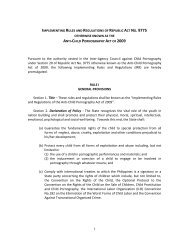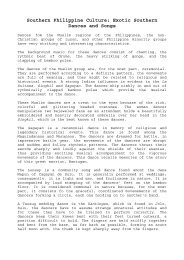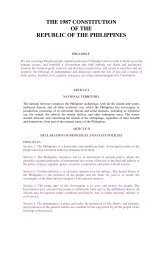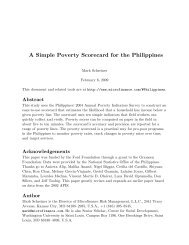HERE - The Roman Catholic church in the Philippines
HERE - The Roman Catholic church in the Philippines
HERE - The Roman Catholic church in the Philippines
Create successful ePaper yourself
Turn your PDF publications into a flip-book with our unique Google optimized e-Paper software.
ROME, 15 NOV. 2005 (ZENIT)A ZENIT DAILY DISPATCHFuneral Masses for a SuicideAnswered by Fa<strong>the</strong>r Edward McNamara, professor of liturgy at <strong>the</strong> Reg<strong>in</strong>a ApostolorumPontifical University.Q: What is <strong>the</strong> current stand of <strong>the</strong> Church regard<strong>in</strong>g <strong>the</strong> possibility of funeral Masses "<strong>in</strong>corpore presente" of persons who are said to have committed suicide? Is it true that <strong>the</strong>re alreadyare mitigat<strong>in</strong>g circumstances, like <strong>the</strong> possibility of irrationality at <strong>the</strong> moment of tak<strong>in</strong>g one'slife (even if <strong>the</strong>re was no note), whereby it would be possible to suppose that <strong>the</strong> person was not<strong>in</strong> his right m<strong>in</strong>d, and that <strong>the</strong>refore it is licit to let <strong>the</strong> funeral entourage to enter a <strong>church</strong> and afuneral Mass be said? — E.C.M., Manila, Philipp<strong>in</strong>esA: In earlier times a person who committed suicide would often be denied funeral rites and evenburial <strong>in</strong> a Church cemetery. However, some consideration has always been taken <strong>in</strong>to accountof <strong>the</strong> person's mental state at <strong>the</strong> time.In one famous case, when Rudolph, <strong>the</strong> heir to <strong>the</strong> throne of <strong>the</strong> Austrian-Hungarian Empire,committed suicide <strong>in</strong> 1889, <strong>the</strong> medical bullet<strong>in</strong> declared evidence of "mental aberrations" sothat Pope Leo XIII would grant a religious funeral and burial <strong>in</strong> <strong>the</strong> imperial crypt. O<strong>the</strong>r similarconcessions were probably quietly made <strong>in</strong> less sonorous cases.Canon law no longer specifically mentions suicide as an impediment to funeral rites or religioussepulture.Canon 1184 mentions only three cases: a notorious apostate, heretic or schismatic; those whorequested cremation for motives contrary to <strong>the</strong> Christian faith; and manifest s<strong>in</strong>ners to whom aChurch funeral cannot be granted without caus<strong>in</strong>g public scandal to <strong>the</strong> faithful. <strong>The</strong>serestrictions apply only if <strong>the</strong>re has been no sign of repentance before death.<strong>The</strong> local bishop weighs any doubtful cases and <strong>in</strong> practice a prudent priest should alwaysconsult with <strong>the</strong> bishop before deny<strong>in</strong>g a funeral Mass.A particular case of suicide might enter <strong>in</strong>to <strong>the</strong> third case — that of a manifest and unrepentants<strong>in</strong>ner — especially if <strong>the</strong> suicide follows ano<strong>the</strong>r grave crime such as murder.In most cases, however, <strong>the</strong> progress made <strong>in</strong> <strong>the</strong> study of <strong>the</strong> underly<strong>in</strong>g causes of selfdestructionshows that <strong>the</strong> vast majority are consequences of an accumulation of psychologicalfactors that impede mak<strong>in</strong>g a free and deliberative act of <strong>the</strong> will.Thus <strong>the</strong> general tendency is to see this extreme gesture as almost always result<strong>in</strong>g from <strong>the</strong>effects of an imbalanced mental state and, as a consequence, it is no longer forbidden to hold afuneral rite for a person who has committed this gesture although each case must still be studiedon its merits.
F<strong>in</strong>ally, it makes little difference, from <strong>the</strong> viewpo<strong>in</strong>t of liturgical law, whe<strong>the</strong>r <strong>the</strong> body ispresent or not. If someone is denied a Church funeral, this applies to all public ceremoniesalthough it does not impede <strong>the</strong> celebration of private Masses for <strong>the</strong> soul of <strong>the</strong> deceased.<strong>The</strong> same pr<strong>in</strong>ciple applies to funeral Masses of those whose body is unavailable for burial dueto loss or destruction. Certa<strong>in</strong>ly <strong>the</strong> rites are different when <strong>the</strong> body is present or absent, but <strong>the</strong>Church's public <strong>in</strong>tercession for <strong>the</strong> deceased is equally manifest <strong>in</strong> both cases. ZE05111522Follow-up: Funeral Masses [11-29-2005]* * *A New Zealand reader asked for clarifications regard<strong>in</strong>g our mention of Canon 1184 that "thosewho requested cremation for motives contrary to <strong>the</strong> Christian faith" were not to be given aChurch funeral (see Nov. 15).She asks: "Can you please tell me what motives for cremation might be considered contrary toChristian faith?"<strong>The</strong> proviso <strong>in</strong> this canon is presumably rarely actually <strong>in</strong>voked. A person would only <strong>in</strong>cur sucha prohibition if, before death, he or she requested cremation explicitly and publicly motivated bya denial of some aspect of Christian faith regard<strong>in</strong>g life after death.Among possible such motivations would be a lack of faith <strong>in</strong> <strong>the</strong> survival of <strong>the</strong> immortal souland thus request<strong>in</strong>g cremation to emphasize <strong>the</strong> def<strong>in</strong>itiveness of death. Ano<strong>the</strong>r could be <strong>the</strong>denial of belief <strong>in</strong> <strong>the</strong> resurrection of <strong>the</strong> dead.More recently, some nom<strong>in</strong>al <strong>Catholic</strong>s who have dabbled <strong>in</strong> New Age pan<strong>the</strong>ism or believe <strong>in</strong>doctr<strong>in</strong>es such as re<strong>in</strong>carnation or migration of souls might request cremation <strong>in</strong> order to follow<strong>the</strong>se esoteric doctr<strong>in</strong>es or <strong>the</strong> customs of some Eastern religions.In all such cases <strong>the</strong> motivation for seek<strong>in</strong>g cremation is contrary to <strong>Catholic</strong> doctr<strong>in</strong>e and, if thisfact is publicly known, perform<strong>in</strong>g a Church funeral could cause scandal or imply that hold<strong>in</strong>g toChurch doctr<strong>in</strong>e is really not that important. ZE05112920Ref.: http://www.ewtn.com/library/Liturgy/zlitur106.htm
















